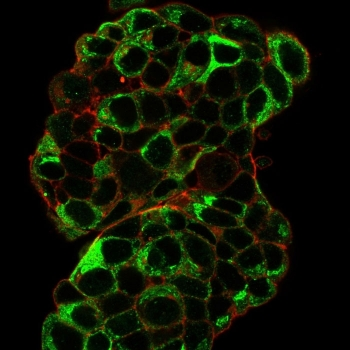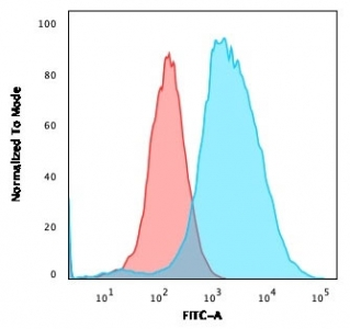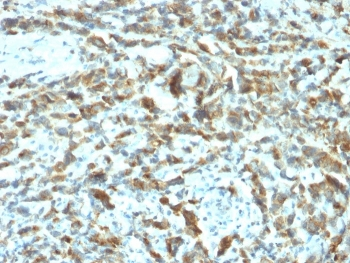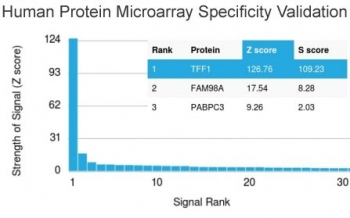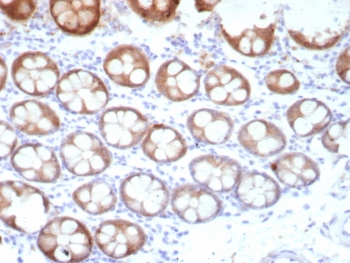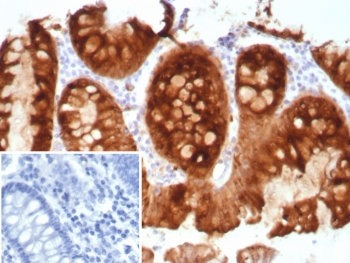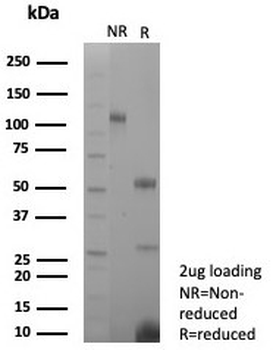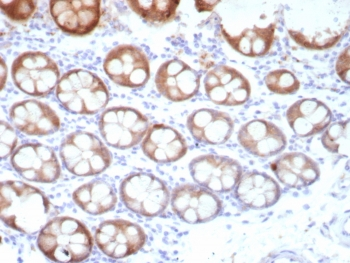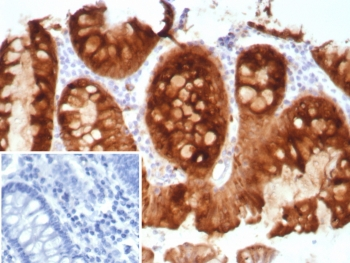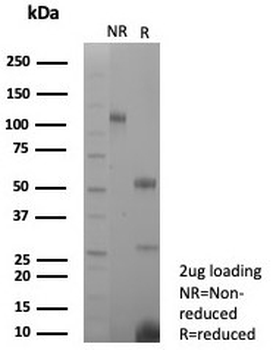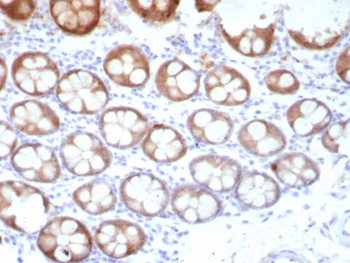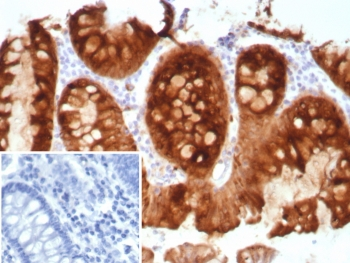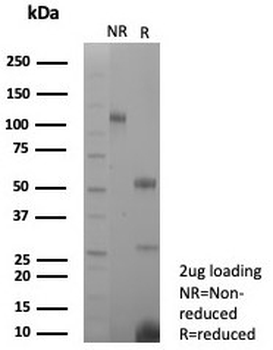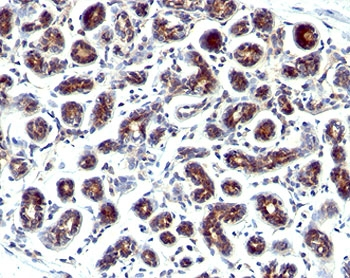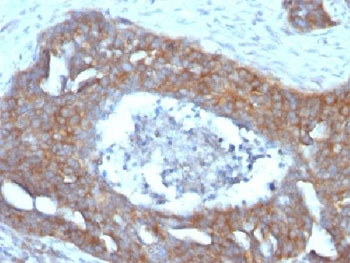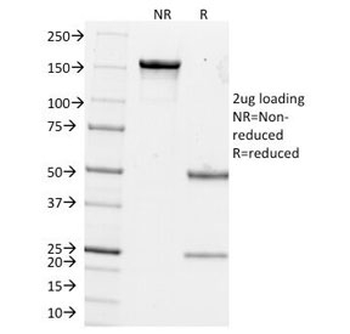You have no items in your shopping cart.
Estrogen Inducible Protein pS2 / TFF1 Antibody
Catalog Number: orb606848
| Catalog Number | orb606848 |
|---|---|
| Category | Antibodies |
| Description | It recognizes a polypeptide of 6.5kDa, identified as pS2 estrogen-regulated protein. pS2 is a trefoil peptide. Trefoil peptides are protease resistant molecules secreted throughout the gut that play a role in mucosal healing. These peptides contain three intra-chain disulfide bonds, forming the trefoil motif, or P-domain. pS2 is known to form dimers and this dimerization is thought to play a role in its protective and healing properties. About 60% of breast carcinomas are positive for pS2. Staining is cytoplasmic, often with localization to the Golgi apparatus. It is shown to be localized in normal stomach mucosa, gastric fluid, goblet cells in the colon and small intestine, and in ulcerations of the gastrointestinal tract. Several studies have shown that pS2 is primarily expressed in estrogen receptor-positive breast tumors and it may define a subset of estrogen-dependent tumors that displays an increased likelihood of response to endocrine therapy. |
| Species/Host | Mouse |
| Clonality | Monoclonal |
| Clone Number | TFF1/2133 |
| Tested applications | FACS, IF, IHC-P |
| Reactivity | Human |
| Isotype | Mouse IgG2b, kappa |
| Immunogen | Recombinant human protein was used as the immunogen for this pS2 antibody. |
| Antibody Type | Primary Antibody |
| Dilution range | Flow cytometry: 1-2ug/million cells,Immunofluorescence: 1-2ug/ml,Immunohistochemistry (FFPE): 1-2ug/ml for 30 min at RT |
| Purity | Protein G affinity chromatography |
| Conjugation | Unconjugated |
| Formula | 0.2 mg/ml in 1X PBS with 0.1 mg/ml BSA (US sourced) and 0.05% sodium azide |
| Hazard Information | This pS2 antibody is available for research use only. |
| UniProt ID | P04155 |
| Storage | Store the pS2 antibody at 2-8°C (with azide) or aliquot and store at -20°C or colder (without azide). |
| Buffer/Preservatives | 0.2 mg/ml in 1X PBS with 0.1 mg/ml rAlbumin (US sourced) and 0.05% sodium azide |
| Note | For research use only |
| Application notes | The optimal dilution of the pS2 antibody for each application should be determined by the researcher.1. The prediluted format is supplied in a dropper bottle and is optimized for use in IHC. After epitope retrieval step (if required), drip mAb solution onto the tissue section and incubate at RT for 30 min. |
| Expiration Date | 12 months from date of receipt. |

Flow cytometry staining of PFA-fixed human MCF7 cells with pS2 antibody; Red = isotype control, Blue = TFF1/2133 antibody.
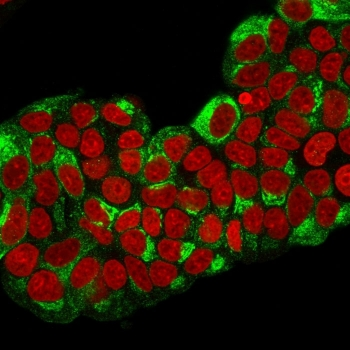
Immunofluorescent staining of PFA-fixed human MCF7 cells with pS2 antibody (clone TFF1/2133, green) and Reddot nuclear stain (red).
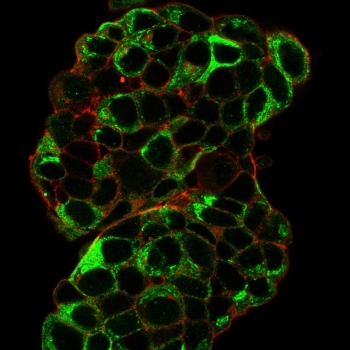
Immunofluorescent staining of PFA-fixed human MCF7 cells with pS2 antibody (clone TFF1/2133, green) and Phalloidin (red).
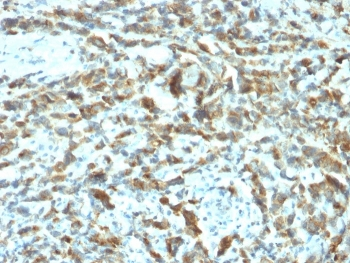
IHC staining of FFPE human breast carcinoma with pS2 antibody (clone TFF1/2133). HIER: boil tissue sections in pH9 10 mM Tris with 1 mM EDTA for 20 min and allow to cool before testing.
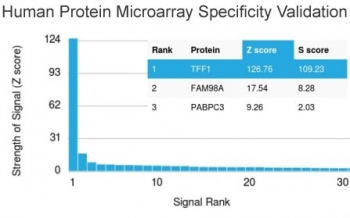
Analysis of HuProt (TM) microarray containing more than 19000 full-length human proteins using pS2 antibody (clone TFF1/2133). These results demonstrate the foremost specificity of the TFF1/2133 mAb. Z- and S- score: The Z-score represents the strength of a signal that an antibody (in combination with a fluorescently-tagged anti-IgG secondary Ab) produces when binding to a particular protein on the HuProt (TM) array. Z-scores are described in units of standard deviations (SD's) above the mean value of all signals generated on that array. If the targets on the HuProt (TM) are arranged in descending order of the Z-score, the S-score is the difference (also in units of SD's) between the Z-scores. The S-score therefore represents the relative target specificity of an Ab to its intended target.
Estrogen Inducible Protein pS2 / TFF1 Antibody [orb2642321]
FACS, IF, IHC-P
Human
Mouse
Monoclonal
Unconjugated
100 μgEstrogen Inducible Protein pS2 / TFF1 Antibody [orb1825361]
IHC-P
Human
Rabbit
Recombinant
Unconjugated
100 μgEstrogen Inducible Protein pS2 / TFF1 Antibody [orb1825362]
IHC-P
Human
Rabbit
Recombinant
Unconjugated
20 μgEstrogen Inducible Protein pS2 / TFF1 Antibody [orb1825363]
IHC-P
Human
Rabbit
Recombinant
Unconjugated
100 μgEstrogen Inducible Protein pS2 / TFF1 Antibody [orb248549]
IHC-P
Human
Mouse
Monoclonal
Unconjugated
20 μg



